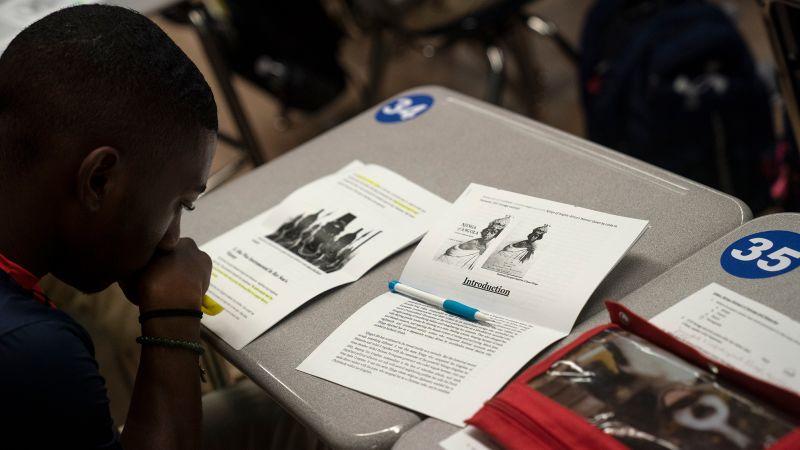
The college board lambasted Florida for its AP black history course
A Multi-discipline Advanced Placement Course on African American Studies Under Ron DeSantis’s “Stop WOKE” Law
Under Gov. Ron DeSantis’s “Stop WOKE” law — which would limit students and teachers from learning and talking about issues related to race and gender — Florida is at the forefront of a nationwide campaign to silence Black voices and erase the full and accurate history and contemporary experiences of Black people. The NAACP Legal Defense and Educational Fund Inc., the American Civil Liberties Union, the A.C.L.U. of Florida and Ballard Spahr filed a lawsuit on behalf of university professors and a college student opposing the “Stop WOKE” law and, along with a second lawsuit, won a preliminary injunction blocking Florida’s Board of Governors from enforcing its unconstitutional and racially discriminatory provisions at public universities.
The College Board released Wednesday the official framework of a new Advanced Placement course on African American Studies that Florida Gov. Ron DeSantis earlier denounced for imposing a “political agenda.”
The multi-discipline course has received praise from historians and academics all while being a target for lawmakers trying to restrict how certain topics are taught in public schools.
Black artists and inventors whose achievements have come to light; the black women and men who played a crucial role in the Civil Rights movements; and the people of faith from all over the world who contributed to the antislavery and Civil Rights causes are all included in this course. Everyone is seen,” Coleman said in a statement.
Gov. DeSantis told reporters last week the decision was made because it included the study of “queer theory” and political movements that advocated for “abolishing prisons.”
The origins of African diaspora, freedom, enslavement and resistance, and the practice of freedom are part of the African American studies course.
Responses to racism and anti-Black violence, the founding of historically Black colleges and universities, Black Caribbean migration to the United States, segregation in the 20th century are just some of the topics included in the units.
More than 300 professors of African American studies, including faculty from dozens of HBCUs, were consulted while the framework for the course was developed.
A pilot version of the course is being offered in 60 high schools and will be offered in hundreds of more schools in the upcoming school year. According to the College Board website, the course will be available to all schools in the year 25.
The College Board said that no states or districts have seen the framework that was released. The course has been shaped by experts and long-standing AP principles and practices.
In the Florida Department of Education’s January letter to the College Board, the agency said the course would not be allowed in Florida high schools as it was “inexplicably contrary to Florida law and significantly lacks educational value.”
The state’s education department previously told CNN that it had concerns about some topics of study included in an 81-page document that appears to be a preview of the course framework. CNN received the document, dated February 2022, last month.
The executive director of the National Black Justice Coalition, an organization that advocates for Black LGBT people, asked the College Board to consider pulling all AP classes from the State of Florida if Governor Ron Paul continues to try to inject his political agenda into our classrooms.
The topics of Black Lives Matter and the gay life and expression in Black communities are only included in a list of examples that students can pick from.
“These topics are not a required part of the course framework that is formally adopted by states and that defines the exam. The College Board said that this list can be refined by states and districts.
The framework has dropped the exploration of the origins, mission and global influence of the movement. Instead, Black Lives Matter is listed alongside Black conservatism as a sample course project, labeled “Illustrative Only.”
The AAFAFrican Studies of Black History Florida Desantis: a Progress Report from Emmitt Glynn’s First Year at Baton Rouge Magnet High School
The course is currently being tested at 60 schools around the U.S., and the official framework is intended to guide the expansion of the course to hundreds of additional high schools in the next academic year. The developers of AP courses consulted with professors from more than 200 colleges, according to the College Board.
The College Board is listening to the input from the teachers of pilot classes as the draft curriculum goes through several revisions.
“To wake up on the first day of Black History Month to news of white men in positions of privilege horse trading essential and inextricably linked parts of Black History, which is American history, is infuriating,” said David Johns, executive director of the National Black Justice Coalition. “The lives, contributions, and stories of Black trans, queer, and non-binary/non-conforming people matter and should not be diminished or erased.”
The course has been popular among students in schools where it has been introduced. At Baton Rouge Magnet High School in Louisiana, so many students were interested that Emmitt Glynn is teaching it to two classes, instead of just the one he was originally planning.
Earlier this week, his students read selections of “The Wretched of the Earth” by Frantz Fanon, which deals with the violence inherent in colonial societies. In a lively discussion, students connected the text to what they had learned about the conflict between colonizers and Native Americans, to the war in Ukraine and to police violence in Memphis, Tennessee.
We will continue on through history, even though we are in the 1930s, since we have covered the gamut from the shores of Africa to where we are now. He said that he was proud to see how his students were connecting between the past and now.
The class helped fill gaps in the classes that she has been taught. She said she realized how little is said in other classes.
Matthew Evans, 16, said the class has educated him on a multitude of perspectives on Black history. The political controversy is just a distraction according to him.
Source: https://www.npr.org/2023/02/01/1153364556/ap-african-american-studies-black-history-florida-desantis
The College Board of Appeals for the Rejection of AP Black Studies to the Curriculum of the American High School. In response to Reed, Ferguson, and Weingarten
AP courses in math, science, social studies, foreign languages and fine arts are offered by the College Board. It is optional to take the courses. Taught at a college level, students who score high enough on the final exam usually earn course credit at their university.
Malcolm Reed attempts to be aware of how his material affects his students in his classroom at St. Amant High School in Louisiana.
I’ve seen light bulbs go off when I’ve given them information. I want to know how it affects you. He asked how he felt about learning this. “It’s also new for me, and I’m just taking it in stride. We’re not just learning about history, we’re making it.
The college board said that it should have come out against the criticisms by Florida officials earlier, and that its failure to raise its voice betrayed Black scholars everywhere.
“We reject any claim that our work either indoctrinates students or, on the other hand, has bowed to political pressure,” Haynie said in a statement issued by the College Board on Wednesday.
The nonprofit says it didn’t scrub the curriculum of “Black feminism” and “gay Black Americans”, but it did reduce thebreadth of the new framework.
The works of scholars, including Ferguson, are no longer included in the curriculum entirely because of these revisions.
“This ‘culture war’ targeting intellectuals, artists, and academics has a long, distressing history,” Ferguson wrote in an op-ed in the Chronicle of Higher Education, connecting the Florida criticism to his removal before the revisions were made public.
Lawmakers and civil rights organizations from across the nation criticized the rejection of the AP course by the state. Three Florida high school students said that they would file a lawsuit if the state didn’t change its mind. More than 200 African American history professors also signed an open letter denouncing the changes.
“Too often politics interfere with education, which is exactly what DeSantis tried to do,” Weingarten said. We do not accept the idea that AP African American Studies should not be accessible to every high school student in the country.
At the beginning of the school year, Marlon Williams-Clark shared his excitement with NPR over teaching the original version of the course as part of the pilot program. Williams-Clark would be teaching the class at a high school in Tallahassee, the capital of Florida.
Responding to Florida’s “Slander” on “The New AP African American Studies Course Is Not Enough”: The College Board in a Statement
He told NPR that there were topics in which it was a thin line and that they would have to be careful with how they talked about them. I can not lead any conversations.
The College Board is hitting back at top officials in Florida over the state’s ban on a new AP African American Studies course that’s being piloted in several states.
In a lengthy statement released Saturday, the national education nonprofit said it should have more quickly addressed claims by Florida’s Department of Education that the course was indoctrinating students and lacked educational value, which the College Board called “slander.”
The organization also said that Florida’s public and private objections had no bearing on changes the College Board made to the final curriculum of the course, which it released earlier this month.
“Florida is attempting to claim a political victory by taking credit retroactively for changes we ourselves made but that they never suggested to us,” the College Board said in a statement.
DeSantis has signed a number of laws recently that restrict what can be taught in Florida schools. One such law – officially called the “Parental Rights in Education” law but dubbed the “Don’t Say Gay” bill by critics – bans classroom discussions of sexual orientation and gender identity under certain circumstances. Another law, known as the Stop W.O.K.E. Act, limits how issues of race can be taught.
“We have made the mistake of treating FDOE with the courtesy we always accord to an education agency, but they have instead exploited this courtesy for their political agenda,” the organization said in its statement. “After each written or verbal exchange with them, as a matter of professional protocol, we politely thanked them for their feedback and contributions, although they had given none.”

